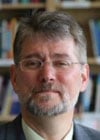
 On October 28, Craig Shealy, professor of graduate psychology at James Madison University and executive director of the International Beliefs and Values Institute, will welcome a panel of distinguished presenters for "Assessing Global Learning: Measurement, Implications, and Applications," an in-depth Faculty Conversation focused on the assessment of global learning.
On October 28, Craig Shealy, professor of graduate psychology at James Madison University and executive director of the International Beliefs and Values Institute, will welcome a panel of distinguished presenters for "Assessing Global Learning: Measurement, Implications, and Applications," an in-depth Faculty Conversation focused on the assessment of global learning.
To help kick things off, NAFSA asked Shealy and presenter Ashley Finley, associate vice president of academic affairs and dean of the Dominican Experience at Dominican University of California, to give a quick preview of what participants can expect from the upcoming conversation.
For those attending this event, briefly explain the importance of measurement, implications, and applications with regard to assessing global learning that promote student success.
Finley: Measurement is a means to an end, not an end in and of itself. The “end” for global learning is to be able to say something meaningful about students’ engagement in these experiences that increases their capacity to think and act differently in a global world. The specifics of how students become better “global learners” can be specified in a number of different ways, but the best assessment should help create a narrative that is relevant to an institution’s mission; faithful to the experiences being fostered; and meaningful enough to engage faculty, staff, and students in ongoing conversations about improvement of global experiences.
For participants new to or with some experience in assessment, what do you hope they gain from this faculty conversation?
Shealy: I want participants to come away with a new appreciation for assessment, to realize that aspects of measurement research and design need not be—indeed, should not be—dreary and dull, but a dynamic exploration of the most compelling questions before us, such as, “Why do some students seem so ready and able to engage with new cultures or contexts whereas others struggle to do so, or even resist such opportunities, when they arise?”
Unfortunately, for lamentable reasons having to do with the actual experiences we have had, our basic perceptions about assessment too often are —in a word—bad. So more than anything, I would like participants in this Faculty Conversation to have the opportunity to reappraise any negative associations they may have about the practice of assessment, and reconsider how such work—when done right and well—can be deeply meaningful and compelling.
Why is assessment in the "real world" vital to improving student learning outcomes?
Finley: Real world application of knowledge is essential for student learning and the achievement of important broad skills or outcomes, from critical thinking to problem-solving to intercultural competence. The opportunity to apply meaning in a context that is as fluid and messy as everyday life provides a nuance to content knowledge that can often be seen as static and distant from the things that students see every day. Students don’t just gain a deeper understanding of material when set in a global context, they have the ability to gain an understanding that seems relevant to them.
Who should attend this event?
Shealy: If you are responsible for assessment at your institution or organization, and want to learn more about how to do it well from a mixed methods perspective—both quantitative and qualitative assessment—this event should be of considerable interest to you. Likewise, if you simply want to learn more about assessment practice and research in a way that awakens the possibilities before you, rather than lulling you to sleep, come join us for what should be a stimulating and substantive conversation.
Join Shealy and Finley on October 28 to share your insights and learn from others interested in the assessment of global learning.
